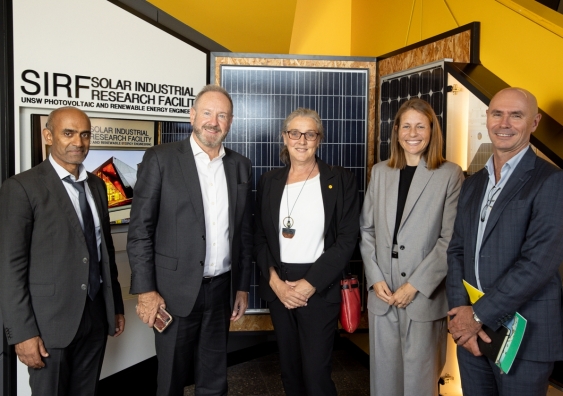UNSW facilitates UN delegation visit on Sustainable Development Goals
The visit deepened the University's commitment to working with the United Nations to achieve meaningful change, especially in the Asia-Pacific region.
The visit deepened the University's commitment to working with the United Nations to achieve meaningful change, especially in the Asia-Pacific region.

Olga Gerloff
UNSW Corporate Communications
0434 498 838
o.gerloff@unsw.edu.au
UNSW Sydney has welcomed David McLachlan-Karr, Regional Director, UN Development Coordination Office (UNDCO) Asia-Pacific for a series of tours and discussions, demonstrating the University’s commitment to partnerships for social impact.
The (IGD) hosted Mr McLachlan-Karr to strengthen relations between the University and the UNDCO and begin discussions on how Australian universities can support the UN in the Asia-Pacific region in the lead-up to the UN's COP31 climate change conference in 2026.
The IGD Director, Associate Professor George Varughese, said Mr McLachlan-Karr’s visit to UNSW was much appreciated and his interactions across campus demonstrated a genuine interest in understanding how Australian universities can support the UN’s work on climate adaptation and resilience, especially for the most vulnerable people in the Asia-Pacific region.
“We recognise that the Development Coordination Office that David leads provides critical guidance and strategic support to UN country teams across the Asia-Pacific,” A/Prof. Varughese said.
“In this regard, his willingness over the past several months to partner with UNSW in piloting substantive interactions with scholars and experts to enable access to cutting-edge knowledge and solutions is innovative and exciting.”
The event, on 28 April, featured a roundtable on “Climate Adaptation and Resilience and the Circular Economy”, a campus tour of UNSW’s climate and circular economy capabilities and a panel discussion on “Disability and Development”, which explored public health systems and disability policies in the Asia-Pacific in the context of disaster risk.
In opening the climate and economy roundtable discussion, UNSW Vice-Chancellor and President Professor Attila Brungs reaffirmed the University’s longstanding vision for positive social impact and its commitment to working in partnership with aligned organisations.
“UNSW has a steadfast commitment to advancing the UN’s Sustainable Development Goals [SDGs]. We recognise the enormous power and potential of collaborating with the United Nations and with other universities, industry and government to develop real solutions to the intersecting issues of climate and economics,” he said.
“Our deep, world-leading credentials in disciplines including climate science, sustainability, the circular economy, and regional development are primed to help solve some of the greatest challenges in the Asia-Pacific. This opportunity to strengthen our relationship with the UN Development Coordination Office and Director David McLachlan-Karr is a privilege and UNSW looks forward to furthering our partnership to bring concrete benefits to communities throughout the region.”
Mr McLachlan-Karr provided the closing remarks for the panel discussion, applauding the rich and exciting conversations and speaking about the Development Coordination Office, the newest entity in the UN, founded in 2018.����
“My office is one of five, and we cover Asia-Pacific, including Iran, Afghanistan, right through to the Pacific, which is the most under-serviced region supported by the UN. It deserves and requires more focus by the UN,” Mr McLachlan-Karr said.
“This is where partnerships with universities become more important. Without these partnerships, we won’t be able to make the leap in development channels. The SDG report card is not good. Covid battered the work on the SDGs worldwide. But unwieldy as they are, the SDGs are our roadmap for development.”
Mr McLachlan-Karr’s visit to UNSW also included a campus tour of the (SMaRT@UNSW), , and the (SIRF).
Read more:
The day concluded with a stimulating panel discussion tackling emerging issues at the intersection of disability, gender, and development, in the Asia-Pacific context of disaster risk, opened by Professor Claire Annesley, Dean of UNSW Arts, Design & Architecture.
“The University has been building connections with David and his team over the past year and this visit is another step towards developing a deeper partnership between the UN and UNSW in the Asia-Pacific region,” Prof. Annesley said.����
“UNSW is developing knowledge partnerships between the UN and academia to explore advocacy and collaboration to accelerate the SDGs and coverage for social impact in the region. Asia and the Pacific is home to more than 700 million persons with disabilities, who face significant barriers to full and effective participation in society. The need to include persons with disabilities in the world’s development mainstream is evident, particularly regarding the SDGs.”
UNSW’s Institute for Global Development – established in 2016 under UNSW’s Strategy 2025 – works to connect and leverage UNSW expertise on development priorities in Australia and provoke critical conversations to drive global development discourse. The IGD supports UNSW’s commitment to the Sustainable Development Goals and the adoption of “SDG thinking” throughout the University.����
Read more about the work of the UNSW .����